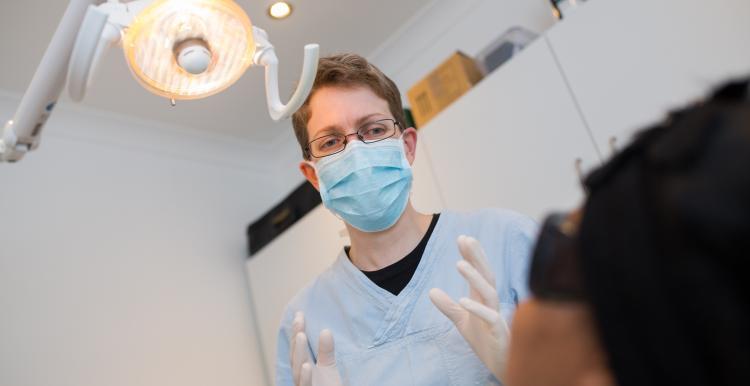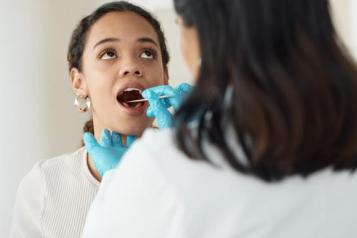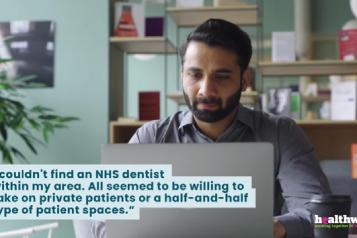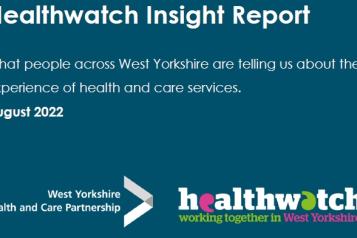Lack of NHS dental appointments widens health inequalities, warns Healthwatch

A representative poll of 2,026 adults based in England found nearly half (49%) of respondents felt NHS dental charges were unfair.
The national poll, which looked at people’s experiences of NHS dentistry, including costs associated with dental care, found that in Yorkshire and the Humber:
- 37% of respondents said they found it difficult to book an NHS dental appointment. Across England this was 41% of respondents, while one in five (20%) couldn’t access all the treatments they needed.
- More than one in 10 (11%) respondents said they had to pay privately to get all the treatment they required. Nationally this was one in four
- Nearly a quarter (23%) reported they felt pressured to pay privately when they booked their dental appointment, while more than a quarter (27%) said their NHS dentist didn’t explain the costs before starting their treatment
- Nearly one in 10 (9%) reported that their NHS dentist charged more for the treatments than the advertised NHS charges.
- Across England, almost a third (29%) said lack of access to dental care led to more serious problems, making them feel anxious. Others said lack of timely dental care made it hard to eat or speak properly (16%); and made them avoid going out (14%).
North-South divide
The shortage of NHS appointments has hit people on low incomes hardest, meaning they are less likely to have dental treatment, compared with those on higher incomes.
The new data also reveals a significant North-South divide when it comes to affordability of dental care. While one in five people (20%) living in the South said they can afford private dental care if they can’t find an NHS dentist, in the North, just seven per cent said they could afford private treatment.
Overall, 38% of the respondents feel they are less likely to visit a dentist, despite clinical guidelines recommending regular dental check-ups to keep people’s mouths healthy.
The findings come as more than 2,000 dentists quit the NHS last year, according to new data obtained by the Association of Dental Groups under freedom of information laws – suggesting a growing trend towards private provision.
Advice and information
Many people contact Healthwatch Bradford and District because they are having difficulties finding an NHS dentist.
Healthwatch has repeatedly raised concerns over the last two years as the twin crisis of access and affordability has continued to grow. Between October 2021 and March 2022, the Healthwatch network heard from 4,808 people about their experiences of dental care, many of whom were struggling to access timely care.
Healthwatch is making renewed calls on NHS England and the Department of Health and Social Care to put a reformed dental contract in place before formal responsibility for dental services passes to the 42 new Integrated Care Systems in April 2023.
Helen Rushworth, lead officer for Healthwatch Bradford and District, said: “Every week, a large proportion of all the feedback we receive from people in Bradford district, including requests for information, is from people struggling to find a dentist offering NHS services.
“It’s deeply concerning that in our area, nearly a quarter of people felt pressured to pay privately when booking a dental appointment. Every week we hear from people who are struggling to find a dental practice taking on new NHS patients.
“The scarcity of available NHS dental appointments means many people in Bradford district are either being driven to pay for private treatment, further ramping up the soaring cost of living, or that they’re having to go without care. On behalf of people in our district, we’re fully behind the Healthwatch England campaign to get something done at a national level.”
Two-tier dental system
Louise Ansari, national director at Healthwatch England, said: “Access to NHS dentistry has been one of the most significant issues people have raised with us in the last two years. There is now a deepening crisis in dental care, leaving people struggling to get treatment or regular check-ups on the NHS.
“The shortage of NHS appointments is creating a two-tier dental system, which widens inequalities and damages the health of the most disadvantaged communities. With millions of households bearing the brunt of the escalating living costs, private treatment is simply not an option and even NHS charges can be a challenge. This needs urgent attention if the Government is to achieve its levelling-up plan and tackle health disparities.
“We are once again calling on the Department of Health and Social Care and NHS England for greater ambition and urgency from NHS dental reform plans to create a fair and inclusive dental service. We strongly recommend that a new dental contract is in place before Integrated Care Systems take on formal responsibility for dentistry from next April.”
Healthwatch England will be sharing the new findings on social media using the #fixNHSdentistry hashtag. Join the conversation.
Research for people with severe mental distress
RESTART is a research priority setting bringing together people with severe mental distress, their carers, clinicians and other partners to identify and prioritise uncertainties, or ‘unanswered questions’, about dental care for people with severe mental distress.
This means conditions such as schizophrenia and other psychotic illnesses, bipolar affective disorder, significant depressive and anxiety disorders and dependency on alcohol or illicit drugs.
People are invited to participate in the Research Priority Setting regarding dental care in people with a wide range of lived experiences of severe mental distress.
Service users, carers, mental health and dental care professionals, academics, funders, charities, foundations, professional bodies and other organisations supporting this group of people are all invited to take part.
You are invited to complete a short online survey (5 minutes approximately) at: https://qmul.onlinesurveys.ac.uk/restart-dental-care
This will help find out what research would make a difference to people with severe mental distress, their carers and health professionals.
For more information, contact e.joury@qmul.ac.uk and follow on Facebook and Twitter


